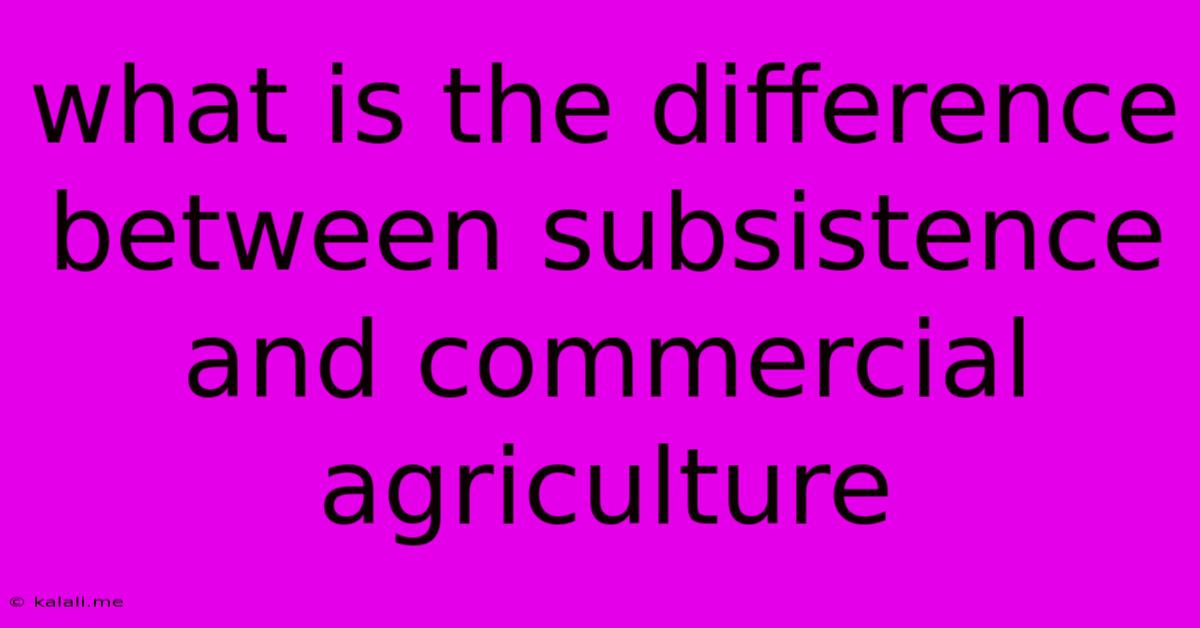What Is The Difference Between Subsistence And Commercial Agriculture
Kalali
Jun 12, 2025 · 3 min read

Table of Contents
Subsistence vs. Commercial Agriculture: A Comprehensive Comparison
Understanding the difference between subsistence and commercial agriculture is crucial for comprehending global food systems and economic disparities. While both involve the cultivation of crops and raising of livestock, their motivations, methods, and impacts differ significantly. This article will delve into the key distinctions between these two agricultural approaches, exploring their characteristics and societal implications.
What is Subsistence Agriculture?
Subsistence agriculture is a farming approach where farmers primarily grow enough food to feed themselves and their families, with little to no surplus for sale. It’s often characterized by small-scale operations, labor-intensive techniques, and reliance on traditional farming methods. Think of a family working a small plot of land to provide their daily meals – that's subsistence farming in action. The focus isn't profit maximization; survival is the primary goal.
Key Characteristics of Subsistence Agriculture:
- Limited use of technology: Modern machinery, fertilizers, and pesticides are often unavailable or unaffordable. Farming relies heavily on manual labor and simple tools.
- Small farm size: Farms are typically small, often supporting only one family.
- Low productivity: Yields are generally low due to limited resources and technology.
- Traditional methods: Farming practices are passed down through generations, often using indigenous knowledge and techniques.
- Self-sufficiency: The primary objective is to produce enough food for the farmer's family, minimizing reliance on external markets.
- Shifting cultivation: In some regions, this may involve rotating fields to allow for soil replenishment. This is also known as slash-and-burn agriculture.
What is Commercial Agriculture?
Commercial agriculture, on the other hand, is geared towards producing food and agricultural products for sale in the market. It's characterized by large-scale operations, high levels of technology and mechanization, and a focus on profit maximization. Think large farms specializing in a single crop or livestock breed, employing sophisticated technologies and aiming for high yields.
Key Characteristics of Commercial Agriculture:
- Extensive use of technology: Modern machinery, fertilizers, pesticides, and irrigation systems are commonly used to maximize efficiency and yield.
- Large farm size: Farms are typically large, employing advanced technology and often specializing in a particular crop or livestock.
- High productivity: Yields are significantly higher compared to subsistence farming due to technological advancements and economies of scale.
- Monoculture: Many commercial farms focus on a single crop (e.g., corn, soybeans, wheat), sometimes leading to environmental concerns.
- Market orientation: Production is driven by market demand, focusing on profitability and efficiency.
- Specialization: Farms often specialize in specific crops or livestock, leveraging expertise and resources for optimized production.
The Key Differences Summarized:
| Feature | Subsistence Agriculture | Commercial Agriculture |
|---|---|---|
| Goal | Self-sufficiency, food security | Profit maximization, market share |
| Scale | Small-scale, family-based | Large-scale, often corporate-owned |
| Technology | Limited, traditional methods | Advanced machinery, technology, inputs |
| Productivity | Low | High |
| Market | Primarily for own consumption | Primarily for sale in the market |
| Labor | Labor-intensive, family labor | Mechanized, often employing hired labor |
Environmental and Social Implications:
Both subsistence and commercial agriculture have significant environmental and social implications. Subsistence farming, while generally less impactful on a per-unit basis, can contribute to deforestation and soil degradation through practices like shifting cultivation. Commercial agriculture, with its intensive use of inputs, can lead to pollution, biodiversity loss, and concerns about the ethical treatment of animals. Understanding these trade-offs is vital for developing sustainable agricultural practices. The increasing global demand for food necessitates finding a balance that ensures food security while minimizing environmental damage.
Latest Posts
Latest Posts
-
Tsunamis May Be Generated By
Jun 13, 2025
-
Which Word Is An Antonym Of Obsolete
Jun 13, 2025
-
What Are The Factors Of 97
Jun 13, 2025
-
Which Of The Following Is A False Statement
Jun 13, 2025
-
Is Ifsc Code And Swift Code Same
Jun 13, 2025
Related Post
Thank you for visiting our website which covers about What Is The Difference Between Subsistence And Commercial Agriculture . We hope the information provided has been useful to you. Feel free to contact us if you have any questions or need further assistance. See you next time and don't miss to bookmark.